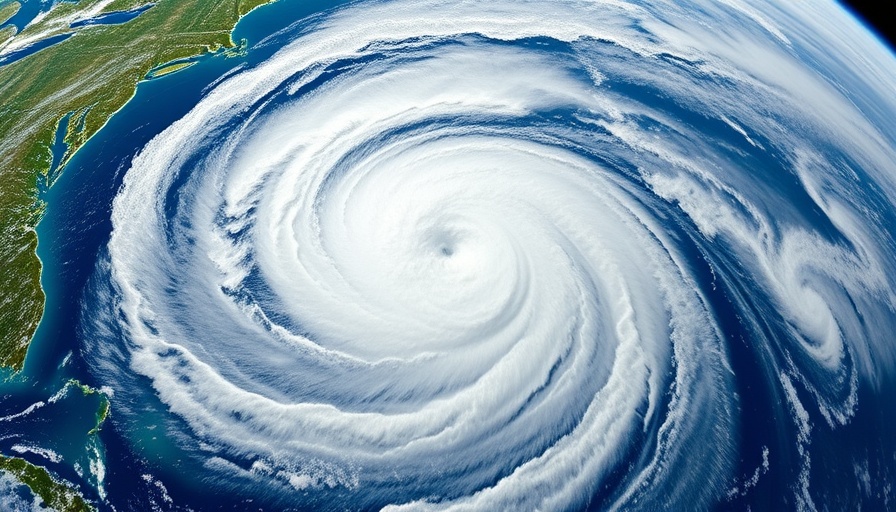
The Alarming Forecast: A Look at This Year’s Hurricane Season
The 2025 Atlantic hurricane season is approaching, set to kick off on June 1, and meteorological forecasts are ringing alarm bells. The National Oceanic and Atmospheric Administration (NOAA) has made a significant announcement: this year is expected to experience above-normal hurricane activity. What does this mean for coastal residents and how can they prepare?
Understanding NOAA’s Predictions
According to NOAA's current outlook, the season may see between 13 to 19 named storms, with 6 to 10 of those turning into hurricanes. Among these, they predict that between 3 to 5 could develop into major hurricanes classified as Category 3 or higher on the Saffir-Simpson Hurricane Wind Scale. With a 70% confidence in these predictions, NOAA estimates a 60% chance for an above-normal season, a 30% chance for a near-normal season, and drastically only a 10% chance of a below-normal year.
What’s Behind the Predictions?
Several pivotal factors contribute to NOAA's forecast. The warmer than average ocean temperatures observed in the Atlantic are particularly concerning, alongside favorable atmospheric conditions characterized by weak wind shear and persistent ENSO-neutral conditions. These elements, coupled with the anticipated activity from the West African Monsoon—which serves as a significant breeding ground for hurricanes—heighten the likelihood of tropical storm formations. Understanding these dynamics is crucial for preparing effective strategies to minimize risk.
The Importance of Personal Preparedness
NOAA's National Weather Service Director Ken Graham emphasizes that these forecasts serve as a clarion call: “be prepared.” Coastal residents must take proactive steps to ensure they are ready before storms threaten. This means having a comprehensive plan in place, gathering essential supplies, and staying informed as the season unfolds. Individual storms’ impacts can be significant, and preparation is key regardless of the overall forecast.
Lessons from Past Seasons
Looking at previous hurricane seasons reminds us how unpredictable and dangerous these storms can be. For instance, the hurricane season of 2020 was notable for its unprecedented activity, creating a sense of urgency about the potential for hurricanes even in predicted “normal” years, especially in the realm of climate change considerations. Historical records illustrate that preparation should be a year-round priority, and communities must remain vigilant.
What This Means for Communities
The impact of hurricanes transcends weather reports. Communities must grapple with the economic and emotional toll that these storms can impose. From immediate concerns about safety and evacuation to long-term impacts on infrastructure and community resources, the implications are far-reaching. This makes the education of residents on emergency protocols and recovery strategies vital in the face of potential storms.
The Economic Considerations of Hurricane Preparedness
Investments in hurricane preparedness can save communities significant funds and resources. Responses to previous storms, such as Hurricane Katrina, highlight the importance of adequate preparations and infrastructure to mitigate disaster impacts. Prioritizing community resilience not only protects lives but also supports economic stability during and after storm events. Initiatives such as local workshops for emergency preparedness can empower residents.
Frequently Asked Questions About Hurricane Preparedness
Q: How can individuals prepare for the hurricane season?
Individuals should ensure they have an emergency kit ready, create an evacuation plan, and stay informed about weather updates.
Q: What should I include in my emergency kit?
Your kit should include essentials such as water, non-perishable food, medications, important documents, and supplies for pets.
Q: Where can I find reliable information during a hurricane?
Stay updated through NOAA, local news stations, and emergency management offices for real-time information and instructions.
Conclusion: Take Action Now!
As the 2025 Atlantic hurricane season looms, the NOAA's above-normal activity prediction should serve as a wake-up call. It’s vital for coastal residents to prepare now—don’t wait until the storm warnings begin. Develop an emergency plan, gather necessary supplies, and most importantly, remain informed. By taking these proactive steps, you can significantly reduce your risks and ensure safety for you and your loved ones.
 Add Element
Add Element  Add Row
Add Row 



 Add Row
Add Row  Add
Add 


Write A Comment